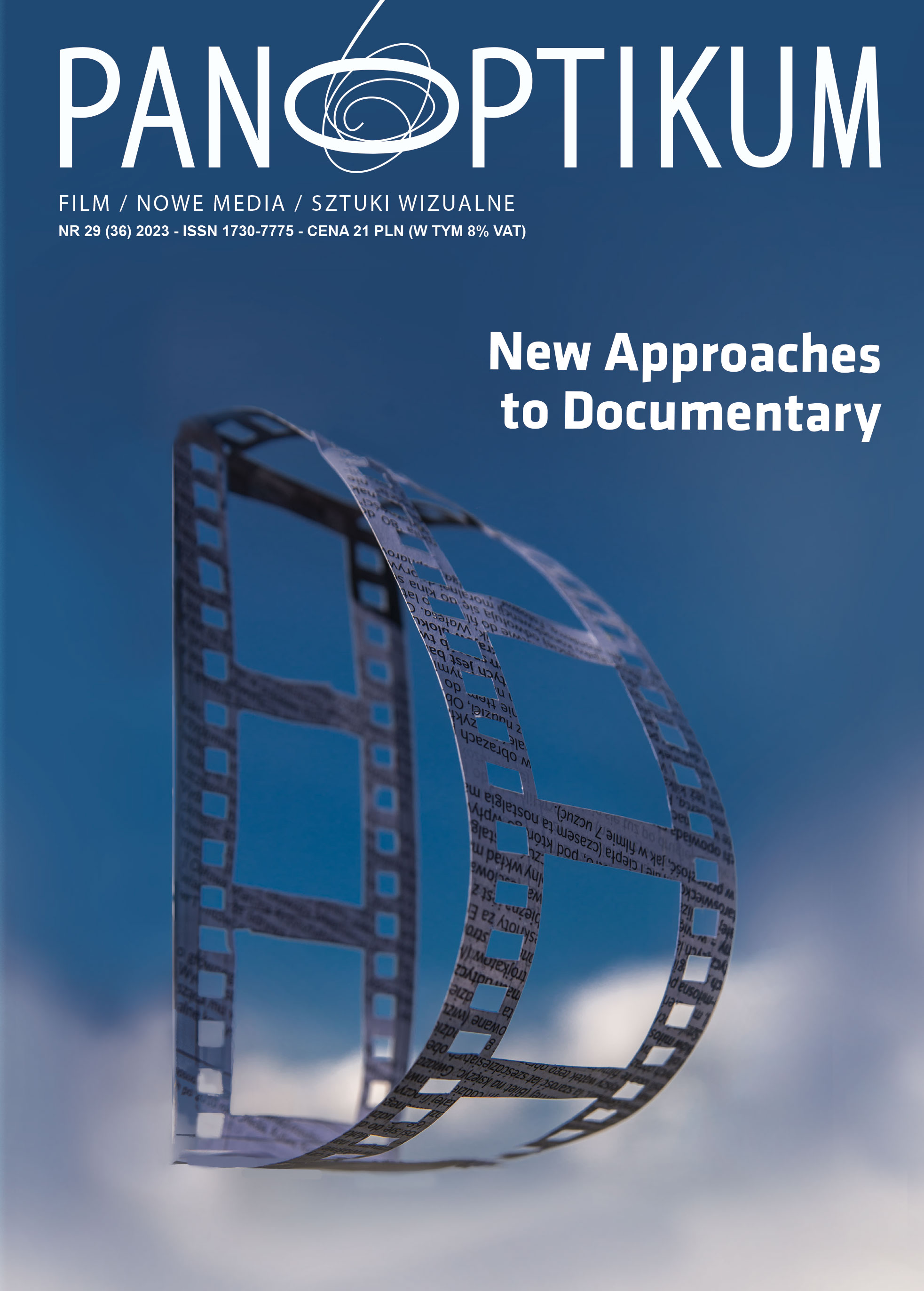In Queer Memory: Mediating Queer Chinese History in Digital Video Documentaries
DOI:
https://doi.org/10.26881/pan.2023.29.06Słowa kluczowe:
queer, digital, documentary, history, memoryAbstrakt
This article examines the digital and cinematic mediation of queer memory in four independent Chinese documentaries: Queer China, “Comrade” China (dir. Cui Zi’en 2008), Our Story (dir. Yang Yang, 2011), We Are Here (dir. Shi Tou and Jing Zhao, 2016) and Shanghai Queer (dir. Chen Xiangqi, 2019). All these films have been made by queer identified filmmakers and have used the digital video documentary format as an activist strategy; all have strived to record China’s queer history in the post-Mao era. However, because of the filmmakers’ gender and sexual subjectivities, together with the historical and social contexts in which these films were made, the four documentaries remember China’s queer history in different ways. Together, these documentaries contest a heteronormative and a homonormative narrative of Chinese history by constructing alternative memories; they also insert queer people’s voices and experiences into that history. All these mediations testify to the heterogeneity of queer people’s experience, as well as the overdetermination of queer memory as a result of a contingent assemblage of factors such as time, place, technology and filmmaker’s gender and sexual subjectivities.
Downloads
Bibliografia
Bao, H. (2015). Digital Video Activism: Narrating History and Memory in Queer China, “Comrade” China. In E. L. Engebretsen, W. F. Schroeder and H. Bao, eds. Queer/Tongzhi China: New Perspectives on Research, Activism and Media Culture, Copenhagen: NIAS Press, 35-56.
Bao, H. (2018). Queer Comrades: Gay Identity and Tongzhi Activism in Postsocialist China, Copenhagen: NIAS Press.
Bao, H. (2019). The Queer Generation: Queer Community Documentary in Postsocialist China. Transnational Screens vol. 10, no. 2, pp. 1-17.
Bao, H. (2020). “We Are Here”: The Politics of Memory in Narrating China’s Queer Feminist History. Continuum: Media and Cultural Studies vol. 34, no. 4, pp. 514-529. DOI: 10.1080/10304312.2020.1785079.
Bao, H. (2021). Queer Media in China, London: Routledge.
Berger, J. (2015). Bento’s Sketchbook, London: Verso.
Berry, C., Lu X., and Rofel, L. (2010). The New Chinese Documentary Movement: For the Public Record, Hong Kong: Hong Kong University Press.
Brunow, D. (2019). Queering the Archive: Amateur Films and LGBT+ Memory. In Ingrid Stigsdotter (ed.), Making the Invisible Visible: Reclaiming Women’s Agency in Swedish Film History and Beyond. Sweden: Kriterium, pp. 97-117. https://doi.org/10.21525/kriterium.21.e.
Chao, S.-Y. (2020). Queer Representations in Chinese-Language Film and the Cultural Landscape, Amsterdam: Amsterdam University Press.
Chou, W. (2000). Tongzhi: Politics of Same-Sex Eroticism in Chinese Societies, New York: Haworth Press.
Cui, Z. (2009). Yong yingxiang xingdong, gaizao shijie [Acting with Digital Videos and Changing the World] http://channel.pybk.com/life/rwjl/2009-08-18/19950.html [accessed 20 January 2020]
Deklerck, S. (2017). Bolstering Queer Desires, Reaching Activist Goals: Practicing Queer Activist Documentary Filmmaking in Mainland China. Studies in Documentary Film vol. 11, no. 3, pp. 232–47.
Derrida, J. (1995). Archive Fever: A Freudian Impression, Chicago, IL: University of Chicago Press.
de Villers, N. (2017). Sexography: Sex Work in Documentary, Minneapolis, MN: University of Minnesota Press.
DOCO (2019). Wei xingshaoshu qunti fasheng: zhe liangbu jilupian zuo daole [These Two Documentaries Give Voice to Gender and Sexual Minority Communities] Zhihu (12, November) https://zhuanlan.zhihu.com/p/91384840 [accessed 1 March 2023] .
Engebretsen, E. L., Schroeder, W. F. and Bao, H. (eds) (2015). Queer/Tongzhi China: New Perspectives on Research, Activism and Media Culture, Copenhagen: NIAS Press.
Fan, P. (2015). Interview with Cui Zi’en. In E. L. Engebretsen, W. F. Schroeder and H. Bao, eds. Queer/Tongzhi China: New Perspectives on Research, Activism and Media Culture, Copenhagen: NIAS Press, pp. 245-266.
Fincher, L. H. (2018). Betraying Big Brother: The Feminist Awakening in China, London: Verso.
Foucault, M. (1991). Nietzsche, Genealogy, History. In P. Rabinow, ed. The Foucault reader. London: Penguin, pp. 76-100.
Hirsch, M. (2008). The Generation of Postmemory. Poetics Today vol. 29, no.1, 103-128.
Horvat, A. (2021). Screening Queer Memory: LGBTQ Pasts in Contemporary Film and Television, London: Bloomsbury.
Kang, W. (2012). The Decriminalisation and Depathologisation of Homosexuality in China. In T. B. Weston et. al., eds. China in and Beyond the Headlines. Lanham, MD: Rowman and Littlefield Publishers, pp. 231-48.
Levenstein, L. (2018). A Social Movement for a Global Age: U.S. Feminism and the Beijing Women’s Conference of 1995. Journal of American History vol. 105, no.2, pp. 336–365.
Liao, S. (2019). “#IAmGay# What About You?”: Storytelling, Discursive Politics, and the Affective Dimension of Social Media Activism against Censorship in China. International Journal of Communication vol. 13, pp. 1-21. Available at https://ijoc.org/index.php/ijoc/article/view/10376.
Mercer, K. (1990). Black Art and the Burden of Representation. Third Text vol. 4, no. 10, pp. 61-78, DOI: 10.1080/09528829008576253.
Pullen, C. (2006). Documenting Gay Men: Identity and Performance in Reality Television and Documentary Film, London: McFarland and Company.
Rhyne, R. (2009). Film Festival Circuits and Stakeholders. In D. Iordanova and R. Rhyne, eds. Film Festival Yearbook 1: The Festival Circuit. St Andrews: St Andrews Film Studies, pp. 9-22.
Robinson, L. (2015). To Whom Do Our Bodies Belong? Being Queer in Chinese DV Documentary. In Z. Zhang and A. Zito, eds. DV Made China: Digital Subjects and Social Transformations After Independent Film. Honolulu: University of Hawai’i Press, pp. 289–315.
Shaw, G., and Zhang, X. (2018). Cyberspace and Gay Rights in a Digital China: Queer Documentary Filmmaking Under State Censorship. China Information vol. 32, no. 2, pp. 270–92. doi:10.1177/0920203X17734134.
Tan, J. (2016). Aesthetics of Queer Becoming: Comrade Yue and Chinese Community- Based Documentaries Online. Critical Studies in Media Communication vol. 33, no.1, pp. 38-52. DOI: 10.1080/15295036.2015.1129064.
Voci, P. (2010). China on Video: Small Screen Realities, New York: Routledge.
Zhang, Z. and Zito, A. (eds.) (2015). DV Made China: Digital Subjects and Social Transformations After Independent Film, Honolulu: University of Hawai’i Press.
Wang, S., and Bao, H. (2023). “Sissy Capital” and the Governance of Non-Normative Genders in China’s Platform Economy. China Information, online publication before print. https://doi.org/10.1177/0920203X221147481.
Waugh, T. (2011). The Right to Be Oneself: Looking Back on Documentary Film. Minneapolis, MN: University of Minnesota Press.

 Uniwersyteckie Czasopisma Naukowe
Uniwersyteckie Czasopisma Naukowe









